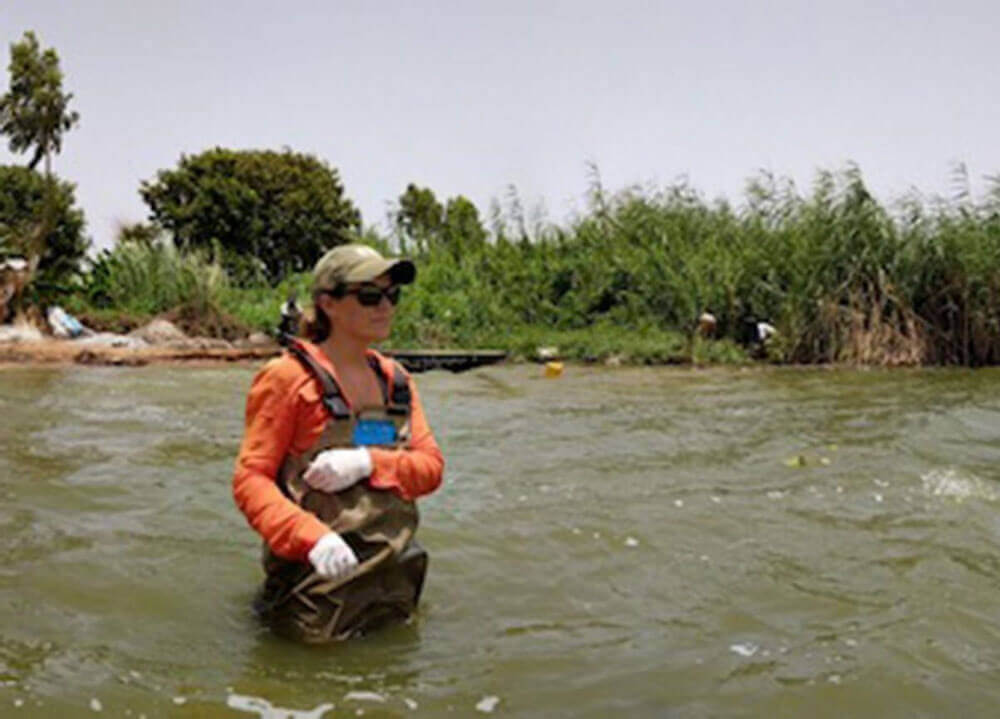
Professor on front lines of global fight against COVID-19
April 15, 2020

April 15, 2020

Caitlin Wolfe, an adjunct professor in our School of Health Sciences, is helping to prevent the spread of global pandemics, while giving the next generation of researchers and scientists the tools to do the same.
Wolfe, who has taught at Quinnipiac since 2014, is deeply involved in both international and domestic virology work:
At the World Health Organization, Wolfe is a consulting epidemiologist. She has consulted for the WHO for several pandemics since 2014, when she spent a year in Liberia working as part of the organization’s Ebola Response team. She was also involved in response to the 2018 Ebola outbreak in the Democratic Republic of the Congo. She is currently working remotely to support the WHO African Region’s Health Emergencies Programme as the response to COVID-19 unfolds across the continent.
At the International Organization for Migration, she is working remotely with the organization’s migration health team to design, pilot and establish community event-based surveillance for COVID-19 in internally displaced persons camps and informal settlements in Iraq.
At the Florida Department of Health, she is part of the clinical virology unit of the Bureau of Public Health Laboratory in Tampa, where she is usually working on norovirus sequencing. Currently, however, she is supporting one of the county health departments with their outbreak investigations conducting some of the case investigations for the confirmed cases of COVID-19 and monitoring their contacts.
At Quinnipiac, she is teaching HSC-270, Pillars of Public Health: Saving the World on a Population Level, where students are introduced to different thematic areas of public health with the hope that students realize public health interacts with just about everything.
“One of their last assignments is to think about how what they've learned about public health applies to their fields of interest and how they'll use what they learned in their future careers,” Wolfe said. “The majority of students are pursuing careers in public health, medicine, nursing, nutrition, health administrations, radiology, and we've had a few pursue interests in veterinary medicine as well.”
The course also examines emerging infectious diseases where students discuss the concept of zoonoses, which is when diseases make the jump from animal populations to humans, similarly to how coronaviruses can behave.
“There is a lesson in here for us all moving forward,” Wolfe said of the broader university community. “We've been warned about a pandemic like this for years, but as a nation, we fail to invest in the public health systems that are needed to keep us safe until we are faced with a problem. When public health systems work, nothing happens. When nothing happens, we forget we need them, and so they get defunded — until something like H1N1, Zika or COVID-19 comes around and then we throw money at it after we realize we're in trouble. We need robust public health systems, and we need the trained public health professionals to keep us all healthy.”
She urges everyone to take this pandemic seriously.
“COVID-19 is not a hoax. This is not a government conspiracy theory. This is a real pandemic,” she stressed. “Stay home. Social distance. Assume that you are infected and act as though you do not want to infect others. Wash your hands, and get your information and news from reputable sources — such as WHO, CDC, Johns Hopkins and the Connecticut Department of Health.”
Quinnipiac Today is your source for what's happening throughout #BobcatNation. Sign up for our weekly email newsletter to be among the first to know about news, events and members of our Bobcat family who are making a positive difference in our world.
Sign Up Now